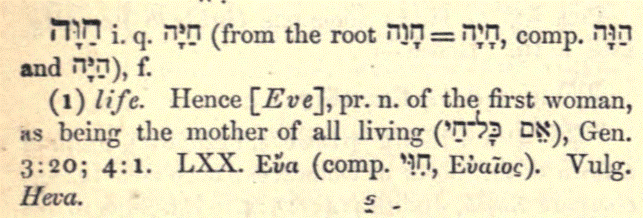There are a lot of questions raised about the early chapters of the Bible, however, few question the names of the very first couple. It seems to be common knowledge that Adam’s wife was named Eve. Nevertheless, sometimes common knowledge is inaccurate knowledge. This certainly seems to be the case with the first created woman.
The Real Name of Adam’s Wife
The wife of Adam was provided a name in Genesis 3:20.
The man gave his wife the name “Eve,” because she was the mother of all the living
(Genesis 3:20)
The problem with this passage is that Eve does not mean “mother of all living” in English. In English it means “the day or period of time immediately before an event or occasion“.[1]https://dictionary.cambridge.org/us/dictionary/english/eve Now one must ask, what does it mean in the original Hebrew? The answer is nothing. There is no Hebrew equivalent of the English name Eve. What we read in Genesis 3:20 (חַוָּה) should be translated into English as “Ḥavah” (note the hard “H”) or “Ḥawah” depending on whether or not one believes the ancient Hebrew Vav was pronounced like a W or a V. Scholars will debate this but it’s not necessary for this post.
Nevertheless, it remains that the Hebrew word “חַוָּה” does not translate (or transliterate) into English as Eve. However, in Hebrew it does have a meaning that makes sense of the Genesis 3:20 phrase. The word means “life” and it derived from the Hebrew verb “הָיָח” which means generically to live (depending on conjugation).
How Did Ḥawah become Eve?
The matter of how we ended up with Eve in English is somewhat explained by the entry in the Gesenius Hebrew-Chaldee Lexicon. It appears that there is another version of this word “חִוִּי” which refers to villagers (or peoples of a village) and is actually pronounced similar to Eve. Since the OT did not receive vowel pointers from the Masoretic scribes until hundreds of years after Jesus, ancient translators might confuse which vowels were supposed to go to the root letters. Because of this, some ancient Greek manuscripts confuse Hebrew word חַוָּה with חִוִּי in the process of translation. The latter of the two would actually be transliterated into Greek as something similar to Eva. It is important to note that Greek lacked the hard H sound which we associate sometimes with the softer “kh” sound in English. So it simply dropped the first consonant and gave us Eva.
This seems been the case with the Latin Vulgate also, where it translates the name of Ḥawah as Heva. This transliteration kept the H but softened it to a standard H sound. Given the fact that early English translations relied so heavily on traditions from the Vulgate, it should be no surprise that they kept the name as Heva or a derivative of it; Eve. Something quite similar happened with the title Lucifer in Isaiah 14:12. It’s also possible that multiple Hebrew manuscripts existed that supplied a variant reading but I have not heard on any to date.

References
| ↑1 | https://dictionary.cambridge.org/us/dictionary/english/eve |
|---|

Hi my name is john Luke I’m catholic brazilian which septuagint is good in english? (Ps. I have KJV/AV 1611 apocrypha, not for dogma but poetry English-like-Shakespeare )
I wouldn’t use the KJV 1611 if you want to read the apocryphal books. Get an NRSV bible. It will be a good English translation and it includes the rest of the books.
Thanks, hey which I can good apocrypha/pseudepigrapha books, there book called “54 apocrypha conplete” and two volumes of charles, for I see you’re more wise man than me(not irony I speak, sorry my English is good), good night sir.
The charlesworth edition is pretty cheap. This is the one I use.
https://www.amazon.com/Old-Testament-Pseudepigrapha-set/dp/1598564897/ref=asc_df_1598564897/?tag=hyprod-20&linkCode=df0&hvadid=312734536225&hvpos=&hvnetw=g&hvrand=9429773309202848642&hvpone=&hvptwo=&hvqmt=&hvdev=c&hvdvcmdl=&hvlocint=&hvlocphy=9015361&hvtargid=pla-432396875420&psc=1
What scholars are saying that ancient Hebrew Vav was NOT pronounced like a W (labio-velar)?
Perhaps “scholars” is too strong of a word XD. I believe the latest figure to argue in favor of the “v” pronunciation was Dr. Nehemiah Gordon. However, he’s no Hebrew scholar. He’s like a youtube televangelist that just happens to have an earned Ph.D…… and it’s in biblical studies, not the Hebrew language.
I believe the argument is that the “w” pronunciation was introduced in the Christian era under the influence of the Arabic language becoming dominant.
Nevertheless, I have not found any actual convincing arguments in favor of the “v” pronunciation. At this stage in your education, I assume you have far surpassed my Hebrew learning. I would love to hear whatever insights you have on this. I feel like we might be overdue for a collaboration
Ohh, interesting! I just watched Nehemiah’s video on it; thank you for bringing his content to my attention. He is correct about Medieval Hebrew—Vav was certainly pronounced like a “v” (labio-dental) by that time. But in the biblical period, there is no question that it was pronounced “w”.
I think the most convincing argument is that when Hebrew developed the matres lectionis during the exilic period (c. 586 BCE), Hebrew used the letter Vav to represent O-class vowels, which would make no sense if the Vav was pronounced “v”. The three consonants used as matres following the exilic period—Vav, Heh, and Yod—are all phonetically similar to the vowels that they come to represent. Notice the shape of your mouth when you pronounce the consonant “y” and then the vowel “ee” (as in “seen”), or pronounce the consonant “w” and then the vowel “oo” (as in “moon”). So the employment of the letter Vav as a vowel marker for O-class vowels would not have happened if Vav were being pronounced as a “v”.
Another demonstration of the original “w” pronunciation is the development of the phrase “his mouth” in biblical Hebrew. If you look at Exodus 4:15 you can see that it is pronounced “Piyhu”, but in 1 Samuel 14:26 it is pronounced “Piyw” (like “pew”), with the consonantal Heh dropped. If the Vav was being pronounced “v” in 1 Samuel (i.e., “Piyv” instead of “Piyw”) we cannot account for the addition of the “v” consonant. But if it is pronounced “w”, we can account for the development because the labio-velar is a semi-vowel and practically identical to the “oo” sound at the end of “Piyhu”.
I could go on, but you get the idea. An original “v” pronunciation is just linguistically indefensible.
Interesting insight! This is not a topic I’ve spent any time on. If you have any helpful reading resources, please link those also for the benefit of all who come here to this conversation after us XD
Unfortunately, I don’t know of any resources specifically addressing the historical pronunciation of Vav off the top of my head, but I did read two books at university that are excellent stepstones for learning about the historical pronunciations of Hebrew (these books will be difficult for those who don’t already know some Hebrew).
-A History of the Hebrew Language by Angel Sáenz-Badillos
-A Short Introduction to the Tiberian Masoretic Bible and its Reading Tradition by Geoffrey Khan
Ok, I did the thing:
https://chetterson.com/2023/08/15/hebrew-letter-vav/
Can’t wait to read!!